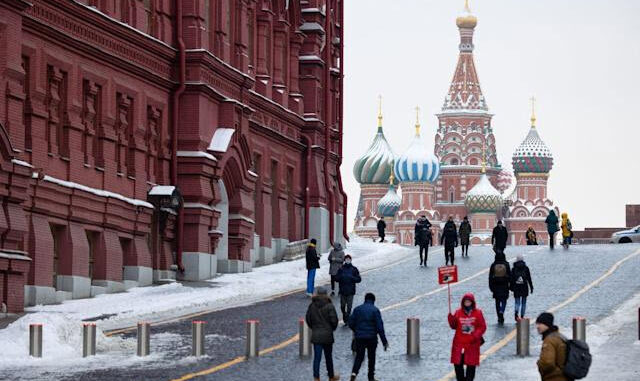
-
Some big European powers expressing worry in talks with the U.S.
- Comes as Russia continues troop buildup near the Ukraine border
Concern among some big European nations about economic fallout raises the risk of a split with the U.S. on how strongly to hit Russia with fresh sanctions if it invades Ukraine, according to people familiar with the matter.
Western allies are united in their desire to prevent a war as they enter high-stakes talks this week aimed at defusing tensions with Russia, warning it faces massive penalties for any incursion. Actions that have been discussed include export controls, curbing Russia’s access to technology, and even cutting it out of the global system for financial payments.
But while the major Western European members of the European Union remain committed in principle to a significant response, some have also aired worries with the U.S. about the potential for damage to their own economies, the people said. The group is still working through economic and legal assessments of the potential sanctions, they said.
European nations also fret that Russia would likely retaliate, possibly even cutting crucial gas supplies to a continent already grappling with record high energy prices. The bulk of any EU-wide response would also have to be unanimously agreed by all 27 member states, a group with differing views on Russia in general.
The U.S. has been consulting with various European nations ahead of the Russia talks, including what is known as the Quint grouping in the North Atlantic Treaty Organization, which involves France, Germany, the U.K. and Italy. It has also held talks with Eastern European states.
Translating well-coordinated words into a joint agreement on some of the specific measures being explored could prove tricky, the people said. The differences underline the challenge the U.S. and its allies face as they try to pressure President Vladimir Putin into reversing his massive troop buildup near the Ukraine border.
The countries have discussed options including cutting Russia out of Swift, the international payments system, limiting Russian banks’ ability to convert currencies and imposing export controls on advanced technologies used in aviation, semiconductors and other components, as well as computers and other consumer goods in more extreme scenarios.
The curbs could hit everything from aircraft avionics and machine tools to smartphones, games consoles, tablets and televisions, another person familiar with the discussions said. Under some actions, Russia could face export controls as stringent as those for Cuba, Iran, North Korea and Syria, which have been largely cut off from global trade and financing, according to the person.
One former official with ties to the current U.S. administration said a point of concern is how much Germany, which has just completed the Nord Stream 2 gas pipeline from Russia, would be on board. The recent departure of Angela Merkel as German chancellor after 16 years has also left a gap in terms of a European leader who can both navigate the EU into an agreement and engage directly with Putin, the person said. The Nord Stream 2 pipeline has not started pumping gas and is still awaiting regulatory approvals from Berlin and Brussels.
“We are coordinating our approach closely with transatlantic and other like-minded partners,” EU foreign policy chief Josep Borrell said Sunday in a blog post. “There is no security in Europe without the security of Ukraine.”
Officials from Russia and the U.S. are in Geneva for talks, with a Russia-NATO council meeting also on the slate for this week, plus talks in Vienna under the Organization for Security and Cooperation in Europe. Putin has said he does not currently plan to invade Ukraine, but is also demanding NATO provide him security guarantees.
U.S. officials are pinning their hopes for common ground in the talks on issues such as arms control and greater communication between their militaries, according to people familiar with the plans, given the NATO guarantees that Putin seeks are a non-starter. They’re willing to explore reciprocal restrictions on strategic bombers and ground-based military exercises, a senior administration official said.
Still, the U.S. will hold off on making firm commitments during the talks, and plans discussions with allies before any agreements, the official added. It won’t negotiate scaling back troop deployments in Eastern Europe, they said, denying an NBC News report.
Deputy Foreign Minister Sergei Ryabkov had dinner with Deputy Secretary of State Wendy Sherman on Sunday in Geneva and told reporters afterward the initial discussions were businesslike but the issues for the countries were complex. “It can’t be easy. But in principle, it was businesslike and I don’t think we will be wasting our time tomorrow,” Ryabkov said.
U.S. Secretary of State Antony Blinken told ABC News earlier on Sunday he didn’t expect a breakthrough this week.
Intelligence assessments and satellite images show there are now more than 100,000 Russian troops in the vicinity of Ukraine. Russia has also developed capabilities to deploy more units in a short period of time, from one to two weeks, according to a military assessment seen by Bloomberg. Russia has shown no sign of de-escalating, officials have said, and is ramping up efforts to target Ukraine with disinformation.
One of the people said a separate military assessment pointed to the possibility Russia moves into the Donbas region in eastern Ukraine before the northern hemisphere spring, rather than a large-scale invasion from multiple locations.
Ukraine and Russia have been in conflict since Putin responded to the 2014 Ukrainian revolution that ousted the pro-Moscow president by seizing Crimea. Russia also backed separatists in eastern Ukraine by sending personnel and weapons, helping stoke a conflict that has killed more than 14,000 people.
— With assistance by Ilya Arkhipov
Source: Bloomberg
